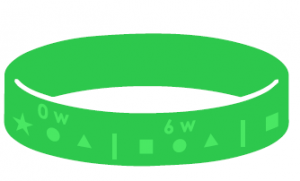A bracelet worn on a new-born baby’s wrist or ankle until the baby is nine months old is believed by Toyin Saraki, wife of the Senate President Bukola Saraki, to have the potential to protect children from preventable death.
Whenever a child receives immunisation, a hole in the bracelet will be punctured. The number of the punctured holes will indicate the doses of a vaccine a child has received. It means that at glance, anyone will know whether a child has received the complete doses of immunisation.
The bracelet is an innovation by Alma Sana, an international non-governmental organisation. In South American countries of Peru and Ecuador, where the bracelet was first used on children, it has been shown to increase uptake and demand for immunisation.
“The fantastic thing about this bracelet is that it is a visual reminder to educate mothers on whether their children have had the right immunisation at the right time,” Saraki told the ICIR.
A baby born in Nigeria has five immunisation schedules — taken within 24 hours of birth, six weeks, 10 weeks, 14 weeks and nine months. Most mothers, especially those in the rural communities, forget to keep tab of these immunisation schedules.
Complete immunisation of children in Nigeria is less than 30 percent, and Nigeria is one of the 10 countries where most incompletely immunised children in the world live. The 2013 Nigeria Demographic and Health Survey indicates that only 25.3 percent of children of immunisation age are completely vaccinated.
Based on the Nigeria Expanded Programme on Immunisation, a child is considered fully vaccinated if at the age of nine months, the child has received: BCG against tuberculosis; three doses of vaccine to prevent diphtheria, pertussis, and tetanus; at least three doses of polio vaccine; one dose of measles vaccine; and three doses of vaccine against pneumonia.
Rotavirus vaccine against diarrhoea has not been introduced into the national immunisation schedule but the vaccine is available in private health facilities.
THE BRACELET
“Not immunising a child is a crime against humanity,” Saraki says. “Immunisation is probably the most sensible investment you can make to promote and protect a child’s health.
“I think anything that reminds us to get the right vaccinations for our children at the right time is a programme that should be supported. It is a great initiative and I hope it reaches every single Nigerian child of immunisation age.”
But reminding mothers about their babies’ immunisation is not enough as many health centres in the rural communities either do not have these vaccines or not functional. A report by the ICIR shows that health centres do not have the means to store the vaccines, and nursing mothers rarely get the vaccines when they take their babies to the health centres.
Alma Sana, the organisation that invented the bracelet, recently won $100,000 from the $1 million GlaxoSmithKline (GSK) Healthcare Innovation Award.
The bracelet, which is fashionable to be worn as a baby’s jewellery, will act as vaccination reminder through symbols embedded in it to remind both the literate and illiterate mothers of their babies’ immunisation schedules.
Although mothers in Nigeria are given immunisation cards by health facilities to keep records of their babies’ vaccination, many of them often forget to come along with the cards to the hospitals.
MORE THAN JUST A VACCINATION REMINDER
Saraki believes that the bracelet will be critical in fighting the high level of malnutrition among children. “You know that this bracelet is to be worn by a child between zero to nine months. So if you see an 11-month-old child and the bracelet is swimming around his wrist, you know that there is a nutrition deficiency that we need to address,” she told the ICIR.
Saraki is confident that the bracelet will not only remind mothers and health workers about the babies’ immunisation schedules but will also indicate how a child is being nourished.
According to Ministry of Health, malnutrition accounts for more than a half of under-five deaths. Apart from death, those who survive malnutrition face a lifelong challenge of physical and cognitive deficiencies. One-third of children under the age of five in Nigeria are stunted (too short for their age) due to nutritional deficiencies.
Scientific evidence shows that stunted children are more likely to have cognitive deficiencies and poor learning outcomes. A report by the Save the Children shows that malnourished children score 7% lower in mathematics tests, are 19% less likely to be able to read at age 8 and are 13% less likely to be in the appropriate grade for their age than those who are well nourished.
This month, Alma Sana in collaboration with the National Primary Health Care Development Agency, is expected to start rolling out 100,000 bracelets to newborn babies in rural communities in a pilot phase.
The bracelet has been applauded by stakeholders in the health sector as a means of reducing the high level of vaccine-preventable death among children.
However, some health experts point out the possibility of this bracelet causing allergic reactions on the babies. The concern is that putting the bracelet on a new-born baby can cause contact dermatitis.
Since the bracelet will be worn by the babies of mostly poor and illiterate mothers with a low level of sanitation, there is a concern that it will accumulate dirt on the babies’ wrists which can be a potential source of transmitting certain infectious agents.
Shola Dele-Owo, Nigeria implementing partner of Alma Sana, says the bracelet has been tested and it is safe. She says the bracelet, which is waterproof and durable to last a whole nine months in a baby’s wrist, was designed by mothers and nurses.
Chikezie can be reached at [email protected]. Follow him on Twitter: @KezieOmeje





















